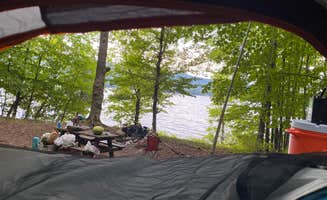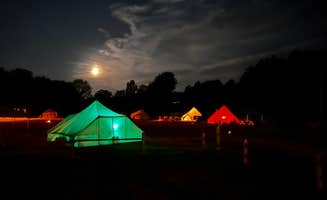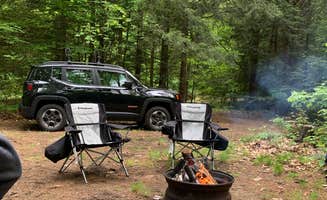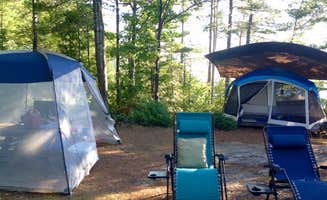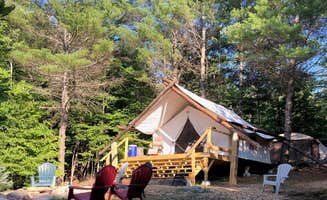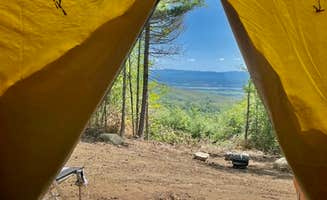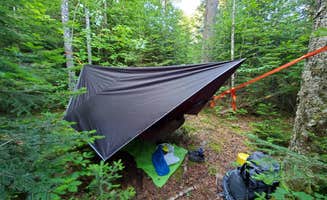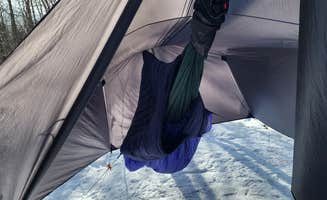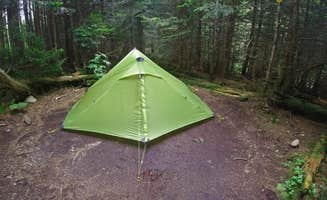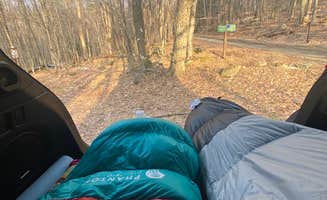Tent camping near Diamond Point, New York centers around the Lake George region's distinctive island and dispersed camping options. Most tent sites require advance reservations during peak season from late spring through early fall. Water temperature in Lake George averages 70°F in July and August, dropping to the mid-50s by late September, influencing the comfort level for island campers who access sites by boat.
What to do
Water recreation access: Glen Island Group campsites offer direct water access with "pristine waters" and "great fishing" according to visitor Justin B., who spent three nights there with his family enjoying both water sports and evening campfires.
Kayaking exploration: The Lake George Islands system provides excellent paddling opportunities, though campers should consider distances carefully. At Narrow Island Group, visitor Rebecca E. notes you'll need either "a power boat ride out there or be up for a long paddle," suggesting proper watercraft planning.
Wilderness hiking: Access to backcountry trails makes Murphy Lake Leanto appealing for hikers seeking solitude. Tony F. describes the approach as "a technical challenge to hike, or bike in on," passing "two other bodies of water, Bennett and Middle Lakes" through varied terrain including "rocky, rooted terrain and pine tree barrens."
What campers like
Private island experiences: Many campers value the seclusion of island camping. At Adirondack Safari, visitors can enjoy glamping options with more amenities than traditional tent sites, providing a comfortable alternative during the summer season when temperatures typically range from 65-80°F.
Natural soundscapes: The sound of water features enhances many camping experiences. At Cod Pond Dispersed Pull-Off, Josie W. appreciated "access to the river down a semi-steep bank" and found it "beautiful to listen to at night," creating a natural soundtrack despite being near a quiet road.
Forced relaxation: The island camping environment creates a distinct psychological benefit. Sam B. loves Narrow Island Group "so much I almost feel like I shouldn't say it's amazing," while Rebecca E. values how after arrival, you "settle in & relax, you aren't going anywhere," creating what she calls "forced relaxation if you want to read, sleep, have limited interaction."
What you should know
Transportation logistics: Island campsites require watercraft for access. Justin B. advises Glen Island visitors need "a decent sized boat with a gas outboard to get there," while Rebecca E. warns about "lots of boat motor noise esp on summer weekends which sadly dilutes the otherwise 'cut off' feeling."
Limited facilities: Most dispersed sites have minimal amenities. Taylor A. reports at Cod Pond Dispersed Pull-Off, "the bugs were terrible" and notes "the ground may look flat but when sleeping-definitely is not," highlighting practical challenges of primitive sites.
Supply planning: Island campers must bring all necessities. Rebecca E. emphasizes "TAKE EVERYTHING you need including extra ice" because "once there, settle in & relax, you aren't going anywhere," underscoring the importance of comprehensive packing for island stays.
Tips for camping with families
Choose established campgrounds: For families with younger children, Stony Creek Family Campground offers more amenities than dispersed sites. Elizabeth P. describes it as "a nice family ran campground," making it suitable for those needing facilities like showers and trash service.
Consider noise factors: Some campsites have ambient noise that may affect light sleepers. At Cod Pond Dispersed Pull-Off, Taylor A. notes, "You can hear cars from the site but the cars can't see you," and "The sound of the cars from the main highway is something I got used to quick."
Book well ahead: Securing island campsites requires advance planning. Rebecca E. advises to "book 9 months in advance & good luck," though notes "last minute cancellations are a common occurance," providing a potential option for flexible family schedules.
Tips from RVers
Tent platform considerations: Many island sites have limited level space beyond the provided platforms. Ryan at Long Island Group found "no leveled space whatsoever (except for one platform per site...but where would a second tent go? On the horrible ground beside it," suggesting bringing compact tent setups.
Weather preparation: Island exposure increases weather vulnerability. Rebecca E. recommends campers "check the weather before your stay—you may be able to swap for a site on the opposite side of the island if you get an idea of where the winds will be coming from. Don't under estimate this tip."
Wildlife awareness: Take precautions against local wildlife. Ryan mentioned being "bombarded with a group of raccoons each night" at Long Island Group, indicating proper food storage containers are essential for tent camping near Diamond Point.


